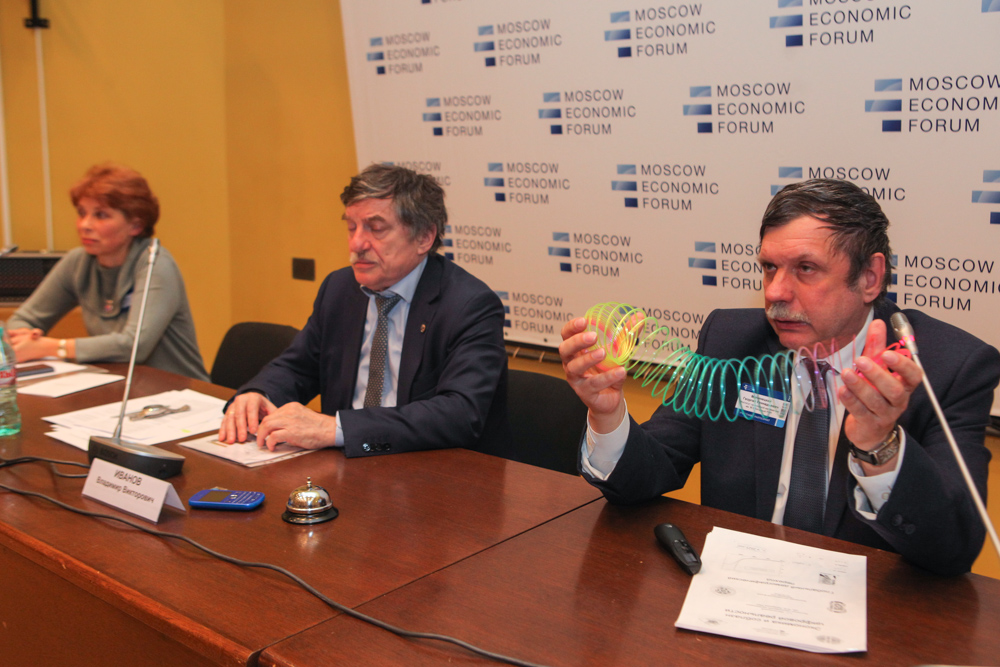MEF-2018: Conference No.3

Published: May 7th, 2018
The world accumulates a huge technological potential, which will make a huge leap in the development of all spheres of human existence. Great and the speed of progress of modern times. The main goal of postindustrialism, sounded in the hall, is the improvement of the quality of life, the priority of human development. This can be done only either in two ways - reduce physical labor, or create a friendly technological space for life. According to experts, in many ways our life depends on technology.Obvious, Elena Lenchuk, director of the Institute of Economics of the Russian Academy of Sciences, said at the conference that labor and capital cease to play the main roles: "We know that the top 10 new technologies have been formed, including 3D printing, blocking, robotization, digitalization, etc. They dramatically increase productivity labor, form new markets; in general, there is a restructuring of the economic system, "- said the speaker. The biggest effect, according to Elena Lenchuk, technologies give production, they also give it a real increase. Today many companies try to live on the system "Industry 4.0", which brings a real competitive advantage in the market.
However, according to Professor Alexander Varshavsky, head of the laboratory of the Central Economics and Mathematics Institute of the Russian Academy of Sciences, in Russia today there is a big question: what exactly is to digitize and to robotize, because most of the equipment that comes to processing industries is not of domestic origin. It turns out that to invest, in fact, nowhere; do not invest in the development of imported equipment.
But will industrial policy only affect the technological revolution? According to Vladimir Ivanov, deputy president of the Russian Academy of Sciences, the use of high technologies has the reverse side of the coin. Developing technology, the scientist thinks, one must think about the danger they are carrying. This problem is not dealt with today, therefore, there are risks. First of all, because of the huge gap between the high level of technology and the low level of culture.
Georgy Malinetsky, head of the department. Department of the Institute of Applied Mathematics. M.V. Keldysh, told the audience another problem. He did not agree with the previous speakers that there was a big technological breakthrough on the threshold. After the creation of the golden billion, the expert is sure, the progress has started to decline. "Yes, computers have started to work faster, but they do not bring novelty," Malinetskiy said. He added that the only thing that is radically changing is the departure from the real to the virtual life. There is a radical scrap, which leads to the degradation of the population.
The period of tectonic processes of global transformation, which came about 6 years ago, has become even more intense today, Sergey Tolkachev said in his speech. According to the speaker, this is due to post-industrial development. "I want to clarify that the term IV of the industrial revolution means exactly the revolution in the manufacturing industry," the expert said. He specified that the information technologies that developed in the 70's and 80's in the service sector would now come to the manufacturing industry. But, unfortunately, in Russia they are far from advanced. According to Tolkachev, Russia still does not invest in innovative activities, does not invest in it and, as a result, has not achieved those indicators that were expected in 2018 in the sphere of production.
Valery Mashchenkov, professor, doctor of economic sciences is sure that the industry is approaching a catastrophic line. He cited the example of machine building, which "practically does not remain." "Of the 2 million people who worked in engineering in 1991, today 560 thousand work. This is four times less than it was. Where will the machine building come from? "- the speaker was outraged. The essence of his proposal is to change the direction of development - to move from the depreciation system and ensure the return of previously spent funds for the purchase of fixed assets, to a system aimed at accumulating funds for the reproduction of fixed assets.
However, an important issue in ensuring the technological development of the country remains the economy. What challenges are facing her today? The Russian economy, the hall said, doubled GDP per capita GDP from the European advanced countries. This gap should be reduced, and this is the first challenge that will have to be dealt with. "With the growth rate of 1.5% and 2.5% in Germany, how will we overcome this?" Said Vladimir Filatov, head of the Center for Innovative Economics and Industrial Policy of the Institute of Economics of the Russian Academy of Sciences.
In general, experts agreed that it is very difficult to develop new technological areas in Russia today. If only because they require sufficient labor resources. If development with a 6-7% annual GDP growth is required, then we must increase productivity by 6-7%. And how to do it on those funds that exist?
Share:
Latest news
07.05.2018 MEF-2018: debate "Cultural policy: between individual freedom and the interests of society?"
07.05.2018 MEF-2018: Conference No. 8
07.05.2018 MEF-2018: Conference No. 4
07.05.2018 MEF-2018: Conference No. 2
07.05.2018 MEF-2018: Conference No.1
26.04.2018 McConnell Discusses Information Warfare
20.04.2018 MEF-2018: closing plenary session
17.04.2018 Mr. Freysinger: «Skripal’s case» for relationship between Russia und European Union?
09.04.2018 MEF-2018: III Plenary discussion
